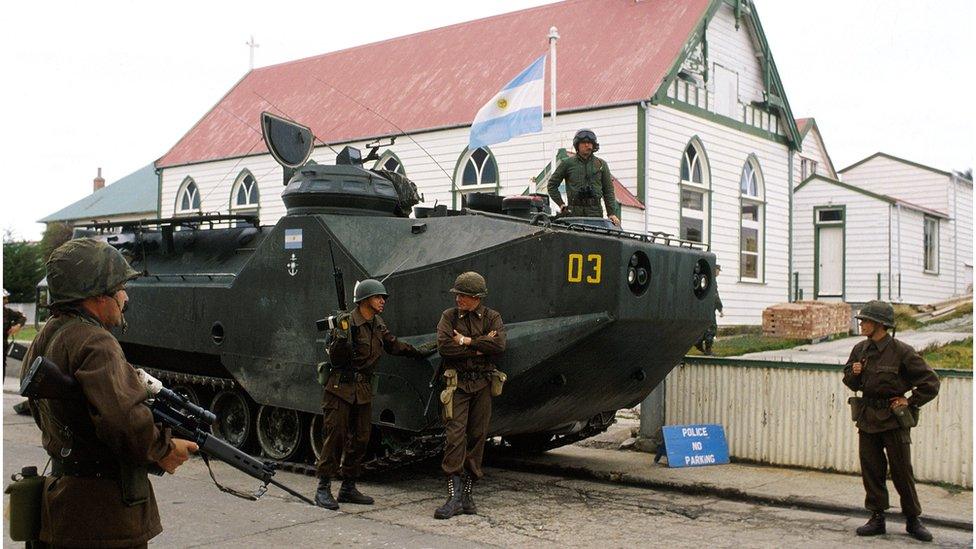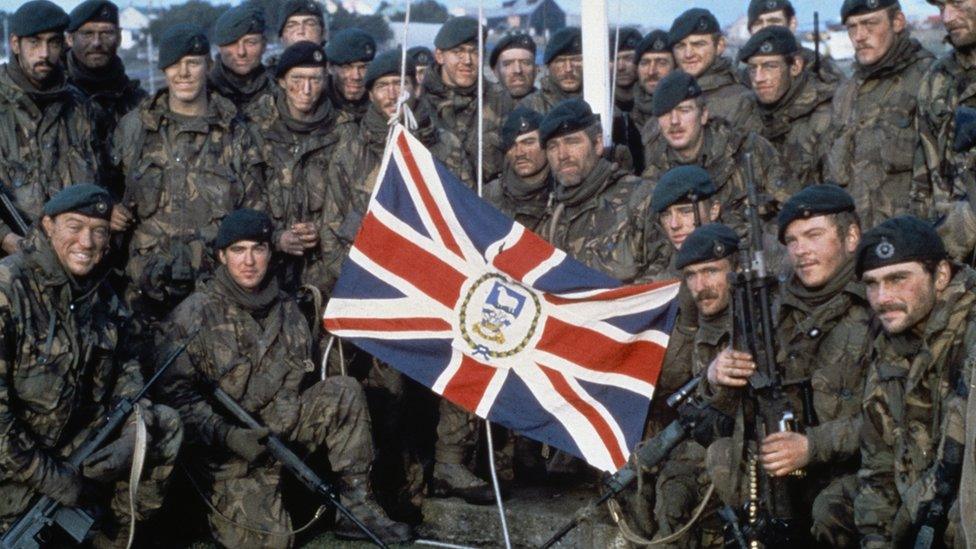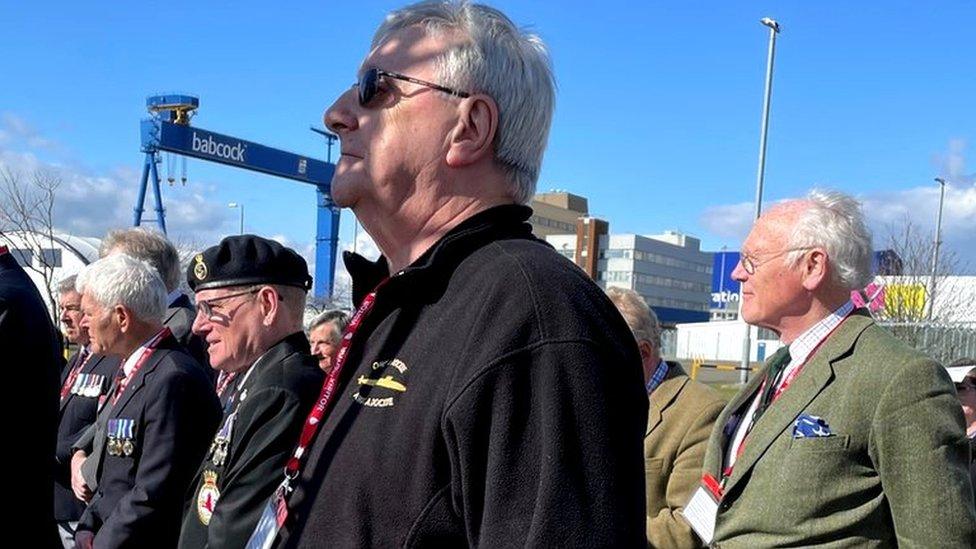We hid in the cellar as the Falklands were invaded
- Published
Margaret Davidson was bringing up a young family when war broke out 40 years ago
Margaret Davidson is well known as the leader of Highland Council but 40 years ago she was bringing up a young family 8,000 miles away in the Falkland Islands when war broke out.
On 2 April 1982, Margaret and her husband Don were running the Malvina House hotel in Port Stanley, the main settlement on the remote UK colony in the South Atlantic, when Argentinian forces invaded.
"They had been threatening for years," says Margaret. "We thought it was all posturing. We never thought it would happen."
Margaret remembers hearing explosions and rifle fire.
"That's how we knew they were coming," she says.
"We went down to the cellar. You'll find that in any war, that's the safest place. You go underground, as they're finding in Ukraine."

Argentinian troops invaded the Falkland islands at the start of April 1982
The UK, which had ruled the islands for 150 years, quickly chose to fight.
Prime Minister Margaret Thatcher said the 1,800 Falklanders were "of British tradition and stock" and a task force was sent to reclaim the islands.
By the time of the invasion, the Davidsons had lived in the Falklands for about a decade.
Margaret grew up in Wolverhampton and then, after university, she worked in New Zealand where she met her husband Don.
He worked for the Met Office and travelled between the Antarctic and New Zealand.
Don had lived in the Falklands and he moved there with Margaret in 1972.
They helped on a sheep farm at first, started a market garden and then moved into Port Stanley to run the hotel.
All three of their children were born on the islands.
Elizabeth was six and Hamish was four when the war broke out. The youngest, Cathy, was just six months old.

Don says a lot of the Argentinian troops expected to be welcomed with open arms by the locals but they definitely weren't.
"They thought they were freeing the Falklands from the British yoke but they were soon sorted out on that," he says.
He says that once they had taken the islands they were not particularly brutal but his wife says it was oppressive to be surrounded by men with rifles when you were used to peaceful island life.
The soldiers closed the school when they arrived and regularly turned up at the door of the Davidsons' house.
"They were the regular army and they were really scary," Margaret says.
"We weren't allowed to have more than two or three people gathering together in the street," she says.
"We listened to the World Service every day to find out what was going on."
The Davidsons tried to continue with normal life in this very abnormal situation.
The two older children read and played a lot, remembers Margaret.

The Davidsons were bringing up a young family on the island when the conflict broke out
She talks about Don reading Gerald Durrell's book My Family And Other Animals to them throughout the conflict.
Margaret says most of the Argentinian soldiers had no idea where they were.
"They had just been drafted in," she says. "They had no idea it was so cold, they had no idea that we didn't speak Spanish, in fact they had no idea.
"Some of them were sick, some of them were aggressive. They were poor souls."
The Davidsons moved out of Port Stanley to Estancia farm on the other side of the island in the hope it would be safer.
Other islanders made the same decision and stayed in the farm and other houses nearby.
The task force of British troops arrived in the Falklands in early May.
They landed at San Carlos on 21 May and the place the Davidsons hoped would be a safe haven ended up being used as a base for a British parachute regiment, which made them a target for the Argentinian soldiers.
But on 14 June Argentina surrendered.

British troops forced the Argentinian surrender in June 1982
The Davidson family was offered a helicopter lift to get back to Port Stanley and start rebuilding their life running the hotel again.
Margaret remembers the town being in chaos with Argentinian bodies still lying on the streets.
And how did they cope with life in a war zone?
"It's just about survival," both Margaret and Don agreed.
After a year back running the hotel, the Davidsons returned to Britain in 1983, settling near Loch Ness.
They set up the Abriachan Nursery overlooking the loch and the garden and nursery have grown up over the hillside over the years. They even have plants from the Falkland Islands growing in the garden as reminders of their time there.
In 1995 Margaret stood for the council as an independent and was elected. In 2015 she became the leader of Highland Council.
She is not standing for re-election in May and says she will be spending more time with her family and their business.
Forty years on, and with what is happening in Ukraine very much in her mind, Margaret says the overriding feeling looking back is of the loss of freedom.
"I remember it was the day after the invasion, I was taking a shower and I just realised it's gone - freedom.
"Franklin D Roosevelt talked about the four freedoms. Freedom of speech, freedom of worship, freedom from want and freedom from fear.
"They are in my mind every day just now. It's the loss of freedom."
Related topics
- Published2 April 2022
